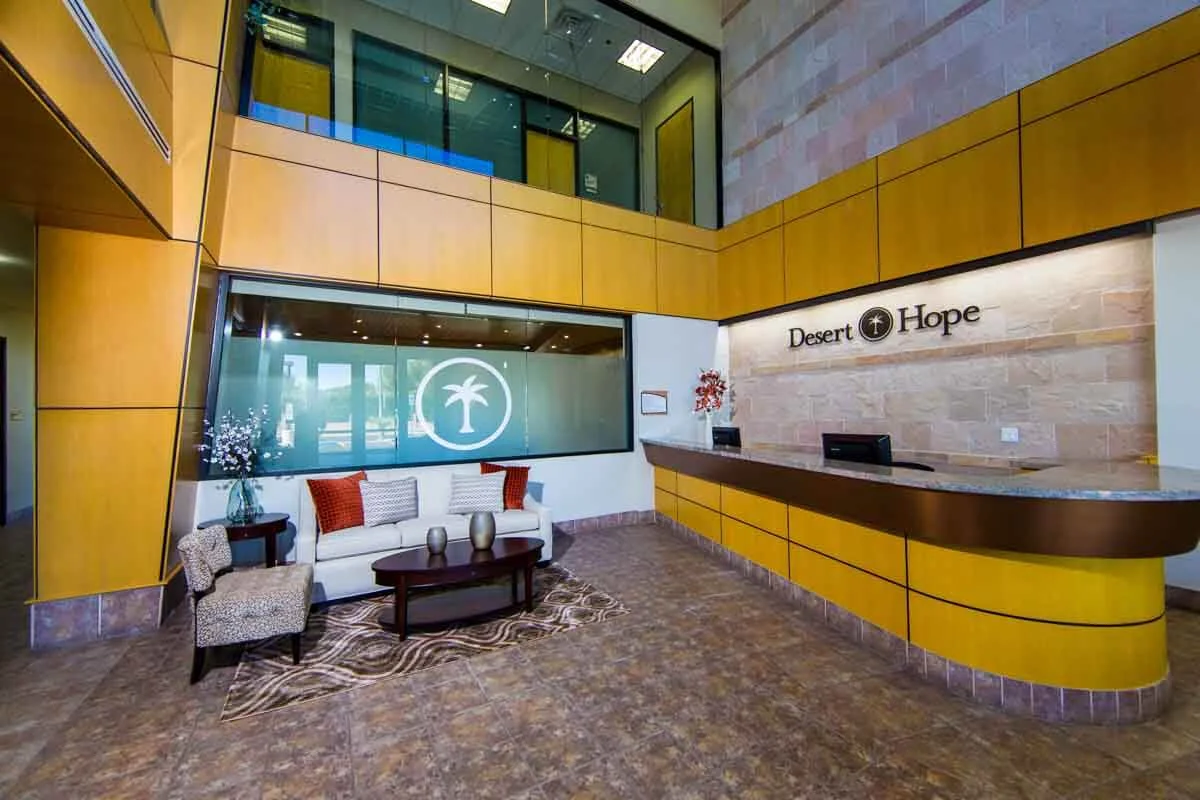Nestled amid the natural beauty of the Nevada desert, Desert Hope is a luxury drug and alcohol rehab for adults in Las Vegas, Nevada. Accredited by CARF, Desert Hope offers a comprehensive range of treatment services, including medically supervised detox, inpatient and outpatient care, sober living, and aftercare programming. Specialized programs are available for young adults, military personnel and veterans, first responders, trauma survivors, LGBTQ+ persons, and individuals with co-occurring addiction and mental illness.
Treatment at Desert Hope begins with a thorough medical and mental health assessment, followed by the development of a personalized care plan.
Inpatient treatment at Desert Hope provides clients with round-the-clock medical supervision and high-level structure and support. During detox, clients may receive FDA-approved medications to alleviate withdrawal symptoms. The inpatient program includes intensive, trauma-informed individual, group, family counseling, motivational interviewing and rational emotive behavioral therapy (REBT), as well as Eye movement desensitization and reprocessing (EMDR) therapy.
Desert Hope’s outpatient programs offer multiple levels of care to meet clients’ evolving needs, including partial hospitalization (PHP), intensive outpatient (IOP), and general outpatient (OP) services. The facility also provides sober living and robust alumni support. Aftercare services may include referrals to additional therapeutic and support programs, ensuring clients have the resources needed for sustained recovery.
At Desert Hope, family involvement is paramount, providing crucial support during the recovery process. The center invites families to participate in therapy sessions and visit on weekends, fostering a healthy dynamic that aids clients as they transition back home.
Desert Hope Information
Treatment
Who We Treat
- Male and Female
- LGBTQ+
- Veterans
- First Responders
Treatment Focus
- Alcohol
- Cognitive Behavioral Therapy
- Drug Addiction
- Family Therapy
- Motivational Interviewing
- Veterans
- First Responders Program
- Group Therapy
Approaches
- Personalized Treatment
- Evidence-Based
- Gender-Specific
- Strengths-Based
- Family Therapy
- Cognitive Behavioral Therapy (CBT)
- 1-on-1 Counseling
- Meditation & Mindfulness
- Medication-Assisted Treatment (MAT)
- Biofeedback
Conditions We Treat
- Depression
- Anxiety
- Bipolar Disorder
- Post Traumatic Stress Disorder (PTSD)
- Obsessive Compulsive Disorder (OCD)
- Trauma
- Codependency
- Anger
- Bipolar
- Stress
- Co-Occurring Disorders
Substances We Treat
- Alcohol
- Benzodiazepines
- Chronic Relapse
- Heroin
- Cocaine
- MDMA/Ecstasy
- Ecstasy
- Psychedelics
Languages
- English
Aftercare
- Aftercare App
- Outpatient Treatment
- Private
- Support Meetings
- Alumni Reunions
- Online Alumni Groups
Experience
On-Site Amenities
- Access to Nature
- Fitness Center
- Outdoor Lounge
Personal Amenities
- Air-Conditioned Rooms
- Armchair or Sofa
- En Suite Bathroom
- Private or Shared Rooms
Off-Site Amenities
- Airport Transfers
On-Site Activities
- AA/NA Meetings
- Alternative Meetings
Off-Site Activities
- AA/NA Meetings
- Alternative Meetings
Special Considerations
- First Responders Program
- Gender-specific groups
- LGBTQ group
Accreditations
-
NAATP
The National Association of Addiction Treatment Providers (NAATP) accreditation for addiction and behavioral health is a recognized and respected certification that signifies a treatment center's commitment to delivering high-quality services in the field of addiction and behavioral health. It serves as an assurance of compliance with industry standards and best practices, ensuring that individuals seeking help receive effective and ethical care. Accreditation from NAATP demonstrates a facility's dedication to maintaining rigorous standards, fostering accountability, and prioritizing the well-being and recovery of its clients.

-
Commission on Accreditation of Rehabilitation Facilities (CARF)
CARF accreditation is a globally recognized certification for rehabilitation and human service organizations. It signifies that an organization meets high-quality standards and is committed to providing top-level care. Achieving CARF accreditation involves a rigorous evaluation process, including on-site surveys. This accreditation enhances an organization's reputation, instills trust in clients and funders, and encourages ongoing excellence in the field.

Additional Locations
Desert Hope Accepts The Following Insurance Plans
Find the best treatment options. Call our free and confidential helpline today!



























